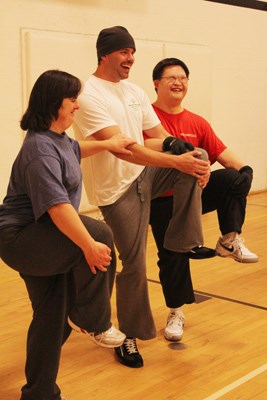On Wednesday nights, Gladstone Secondary School is alive with the sounds of more than 35 mentally challenged athletes being put through a boot camp style of fitness training by volunteer coaches from the Vancouver Police Department.
This program is called Club Fit, and is a fitness program for ages 14 and up designed specifically for Special Olympics athletes of varying skill levels. The goal is to improve their overall health and fitness, and the training includes basketball, handball, soccer, and track and field.
The athletes competed at the 2013 BC Summer Games in Langley July 11 to 13, and are preparing for the 2014 Canadian National Summer Games to be held at UBC. After a summer break, the Gladstone Club Fit program will return Oct. 2 and run to April 2 next year.
Emmanuel Tale Budica is one of the kids who joined the program. Budica is in Grade 8 at Gladstone and says he's looking forward to playing soccer, basketball and capture the flag:
"I want to become strong, fit and active like the police," he said.
The VPD has been working jointly with Special Olympics B.C. (SOBC), a registered charitable
organization that has worked to help disabled athletes since 1980. "Anyone watching can see in the eyes and faces of the athletes how much they enjoy working closely with the VPD members in the various activities - the athletes are beaming every second of the sessions," said SOBC spokesperson Megan Grittani-Livingston.
The athletes are taught aerobic conditioning, flexibility, coordination, and teamwork, plus muscle strengthening with very small weights. There is also some focus on personal wellbeing, nutrition and safety tips.
The program is limited to Gladstone for now but Ron Scott, the Vancouver School Board's community schools coordinator based out of Gladstone, says as word of the program has grown in the school's lifeskills classes, so has interest.
There are about 30 department members led by VPD Superintendent Dean Robinson now involved with the SOBC's Vancouver Club Fit program. Robinson says the story began last summer when he was asked to start a fitness club. When he put out a call for volunteers in the VPD bulletin, he got a huge response.
"It was a big hit," said Robinson. "It was hard to know who got the most out of the program,
the athletes or the volunteers. They have a personal best. They are thrilled to be running faster than they were at the last game, or to score more points at floor hockey." He noted the games are always focused on having fun more than competition.
The police help the athletes in other ways. The Law Enforcement Torch Run (LETR) was started in 1981 in Wichita, Kansas, and then spread across North America. This marks the 23rd year of the movement in B.C., and since 1990 the LETR in B.C. has raised more than $3.4 million to support Special Olympics athletes. More than 750 law officers from many agencies jogged in the 2013 Torch Run in B.C., hitting the streets in support of Special Olympics in 30 communities in June.
"I've been lucky enough to have many proud moments in my law enforcement career," Robinson wrote, "and standing with the athletes of Special Olympics is certainly the most special."
Overall, there are now 4,100 Special Olympics B.C. athletes in 55 communities around the province, helped by 3,200 volunteers. The SOBC program is open to people with mental disabilities of all ages, and participants range in age from two to 83.
Submitted Photo / A member of the VPD works out with two Special Olympics athletes at Gladstone secondary school.;



